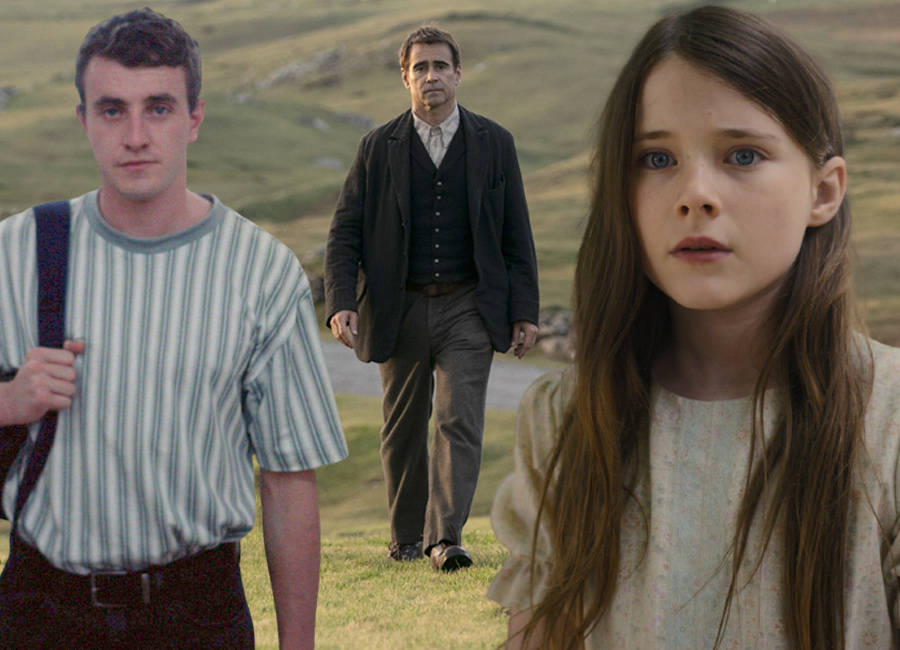Ireland received a record 14 Oscar nominations this week as Martin McDonagh's black comedy The Banshees of Inisherin marked itself as a leading contender for Best Picture with nine nods in all, including recognition for actors Colin Farrell, Brendan Gleeson, Kerry Condon and Barry Keoghan.
Kildare’s Paul Mescal made the cut for Best Actor for his role as a struggling father in Aftersun, while visual effects artist Richard Baneham and editor Jonathan Redmond were shortlisted for their work on Avatar: the Way of Water and Elvis, respectively.
Despite the Irish interest, the above films are largely Hollywood productions – Banshees was ultimately underwritten by Disney and the UK’s Channel 4 – but there was also recognition for An Irish Goodbye, produced by Belfast’s Tom Berkeley and Ross White, in Best Live Action Short and An Cailín Ciúin (The Quiet Girl) in Best International Feature Film, formerly Best Foreign Language Film.
As Deirbhile Ní Churraighín, commissioning editor with special responsibility for drama at Cine4, the taxpayer-funded scheme that financed An Cailín Ciúin, says, it is “the first Irish film that was completely made here, that was completely funded here to make the Oscars.”
An Cailín Ciúin was catapulted to public attention last February when it won prizes at the prestigious Berlin Film Festival before winning seven IFTAs, going on to earn more than €1m at the box office in Ireland and the UK following its release in May, and becoming the highest-grossing Irish-language film of all-time.
It was quickly installed as Ireland’s nomination for the Oscars and continued to receive plaudits as it screened around the world, providing necessary momentum for the film to get onto the 15-film Oscar longlist before beating the likes of Mexico’s Netflix-backed Bardo to make the final five.
An Cailín Ciúin is one of six films, along with Finky, Arracht, Foscadh, Róise & Frank and Tarrac, that have been produced to date under Cine4, the Irish-language film development scheme jointly funded by TG4, Screen Ireland and the Broadcasting Authority of Ireland (BAI), or “the magic triangle” as it is described by Ní Churraighín.
Alan Esslemont had been part of senior management when TG4 launched in 1996 and worked at BBC Alba in his native Scotland before returning to lead TG4 in 2016 with plans to strengthen regional film and television production and generally push back against the marginalisation of the Irish language in public life.
That year, he pitched a closed development scheme for Irish-language film to Screen Ireland’s James Hickey and the BAI's Michael O’Keefe – his counterparts at the state development agency for the Irish film, television and animation industry and the Irish broadcasting regulator – both of whom responded “very enthusiastically”.
The first call for submissions was made by the trio at the 2017 Celtic Media Festival, with two more call-outs in 2018 before the first selections went into production in 2019, continuing during the height of Covid the following year.
Each call-out receives around 20-25 submissions, which are then whittled down to five by Ní Churraighín, her colleague Máire Ní Chonláin and representatives from Screen Ireland, formerly the Irish Film Board. The chosen five are each given €25,000 for script development before two are chosen to be produced on a budget of €1.2m, with TG4, Screen Ireland and the BAI each providing a third of the financing.
Cine4 productions also avail of Section 481 tax relief, which offers a 32% credit on eligible expenditure or 80% of film production costs. The creators that miss out retain the copyright and can pitch their project elsewhere without having to pay back the €25,000.
Oscar success for Irish film was always part of the “moonshot vision” for Cine4, according to Esslemont, and an important “marker of ambition” for the nascent scheme.
“I wanted people to understand that this scheme had to have ambition … and I think that’s why it has been so successful. In the past, there hasn’t been ambition for the Irish language,” he explains, but he also hoped it acts as a catalyst for regional production in an industry that is always weighted towards Dublin.
“In the context of public service media ... the ecosystem is very monolithic, and we’ve argued for a number of years now that it should be balanced. We’ve argued for more money for Screen Ireland because that’s definitely working. We’ve argued for more money for BAI’s Sound & Vision [radio and television production scheme] because that’s creating Irish intellectual property, and we’ve argued for more funding for TG4 because … exactly 30 years ago there was a Welsh-language film called Hedd Wyn that got an Oscar nomination.
“For me, the Welsh have always had more ambition for their language than in Ireland. We’ve argued very strongly that we should be working at the same level as [Welsh-language TV channel] S4C, which has more than double our funding. And we believe then that with more funding, you’ve got an ecosystem that’s a lot broader and the critical public infrastructure becomes more balanced, fairer, and it spreads throughout the country.”
Beyond pushing against industrial and cultural tides though, Cine4 has also provided a platform for Irish talent such An Cailín Ciúin writer-director Colm Bairéad and producer Cleona Ní Chrualaoi, and director Tomás Ó Súilleabháin, whose film Arracht came close to making the Oscars longlist in 2021.
“We knew we had the talent, the writers, the directors, and all they needed was a springboard, so our partnership with BAI and Screen Ireland provided that where they could just take off,” says Ní Churraighín.
“These filmmakers had made short films before, and there was no place else to go except into the world of English, so it provided the talent we knew was there to work through the Irish language.”
Of course, more goes into achieving an Oscar nomination than a years-long effort to foster Irish filmmaking. A strong marketing plan, a good sales agent, and US distribution are vital to getting international films in front of Academy voters, according to Screen Ireland head of marketing & communications Louise Ryan.
“We know in Ireland that we can qualify films for the foreign language category [at the Oscars], but it’s an incredibly competitive category against … the best of world cinema, and you’re also going against these huge auteurs with a backlog of award-winning films and a well-known brand, and a well-oiled machine such as the French film industry,” she says of the struggle.
Ryan credits the An Cailín Ciúin team for producing “beautiful” marketing and social media materials with the assistance of Screen Ireland at the Berlin Film Festival, where the film premiered, helping to stoke interest despite relatively poor industry attendance due to Covid.
An Cailín Ciúin secured London-based Bankside Films as an international sales agent at the Cannes film market in May before roping in Super as its US distributor -- the company will release the film in America next month. Super, Screen Ireland, Irish distributor Break Out Pictures, and UK distributor Curzon have invested and worked on the Oscar campaign together.

Ryan explains that Screen Ireland and Super put together a plan to target Academy voters with support from Department of Foreign Affairs cultural officers in New York and Los Angeles as well as Irish talent such as Pierce Brosnan, Aisling Bea, and Chris O’Dowd.
Bairéad and Ní Chrualaoi have toured An Cailín Ciuin relentlessly, attending screenings at festivals and taking part in Q&A sessions worldwide, and the campaign was also helped by the film’s appearance on end-of-year lists at influential publications such as The Guardian, The Hollywood Reporter, and Variety.
“When you’re going up against huge competition, you have to use every tool in your box, every contact, and [Screen Ireland] would have helped with international trade contacts, international sales contacts, and help to make the introductions,” says Ryan.
“You've got to utilise every avenue to help get the word out there, and when word of mouth began to grow around the film, everyone wanted to help – you could see they were garnering a lot of international support.”
TG4 estimates that for every €1 invested in Cine4 productions, €2 is returned to the Exchequer in tax, but Esslemont and Ní Churraighín are certain of the intangible benefits of the scheme and success stories like An Cailín Ciúin.
“Part of the value of the work that we all do in English and Irish in cinema, television and also in the arts is basically what the Future of Media Commission calls critical public infrastructure. That's got a key value for Ireland in that it creates the glue that ties us all together,” Esslemont states.
“You have to take into account soft power. [News of the nomination] went around the globe, and that’s a really good story about Ireland and Ireland’s minority language. That’s really important because people’s understanding of your country is really important, so the ability to create soft power is huge.”
Ní Churraighín adds: “We’re not making barrels of money on this, but it’s still worth it. The benefits to the creative industry in the west of Ireland — so many people working, so many people visiting, so many people having ambition — is immeasurable."
The latest Cine4 film, Tarrac, a sporting drama about rowers in Kerry, premiered at the Galway Film Fleadh last July. The next two Cine4 films are set to enter production in the next six months – An Fhidil Ghorm, a children’s film about a young fiddler trying to follow in her father’s footsteps; and Fréamhacha, a Stranger Things-inspired fantasy film about a young nurse who finds a portal to another world in Donegal.
Two more films have also been approved under the scheme, and another call-out is due to be announced. Ní Churraighín says the idea is to get to the stage “where it’s no big deal if an Irish film is in cinemas,” which globally have struggled to build interest in smaller films not attached to existing intellectual property since the pandemic.
Further development of Cine4 is dependent on extra funding, and neither TG4 nor Screen Ireland have any plans to expand the scheme to more films or increase production budgets for the time being.
In its Post-Covid Vision 2022-25, TG4 asked the government for €9-10m per year in additional funding by 2025, or a total of €37.8m, €10.95m of which would go towards 278 hours of new film and drama projects. TG4 received €44.9m from the Exchequer in 2022, an increase of €4.2m year-on-year.
At present, the company preparing to launch children’s TV channel Cúla4 in September, and it is collaborating with the BBC, Northern Ireland Screen, and the BAI on an eight-part murder mystery set in Donegal that it hopes will become a returning series.
More widely, during a bumper 2021, approximately €500m was spent by film and television productions in Ireland as major productions such as Disney’s Disenchanted and ITV series Holding, adapted from the Graham Norton novel, began filming.
It is expected that the total annual production spend for 2022 will be down year-on-year, but still ahead of pre-pandemic levels (€357m in 2019), as so many projects were undertaken in 2021 following Covid postponements the previous year.
Esslemont is also curious to see how the EU’s Audiovisual Media Services Directive, referred to in some quarters as the Netflix tax, will be finally implemented by the BAI in Ireland.
The directive sets a 30% quota for European productions on streaming services, and requires the likes of Netflix and Amazon to produce dramas in the language of the countries in which they operate. German war drama and Best International Feature Film frontrunner All Quiet on the Western Front is one such example.
Industry figures here have also called for a 3% levy on steamers, which would raise €25m a year for the Irish film and television sector. The Future of Media Commission is now assessing the feasibility of the idea.
If the streamers were to enter into Irish-language production, Esselemont believes it “would take the Irish language to a budget level that TG4 could never provide,” adding that the directive has been good for minority-language productions (Catalan, Basque, Galician) in Spain.
Ultimately, Oscar recognition puts a spotlight on Irish talent and makes films easier to get made, as seen at the ongoing Sundance Film Festival, where Once director John Carney’s latest film Flora and Son, starring Eve Hewson and Joseph Gordon-Levitt, sold to Apple for a reported $20m.
“We’ve had huge international coverage on the success, and then it becomes easier to finance your films if the cast are better known,” says Ryan. “Paul Mescal and Kerry Condon – they’re Oscar-nominated, and if you can attach those talents, [films] become easier to sell.
“Investing in creative talents, creating that ecosystem of creativity in Ireland, being a world class destination for international film, but also creating your own [intellectual property] and investing in your own stories on screen … you really begin to see the results of that, and then when you win the awards, it does become somewhat easier to get those films made.”
Photo: (l-r) Paul Mescal, Colin Farrell, and Catherine Clinch. (Pic: Mubi/Searchlight Pictures/Break Out Pictures)











